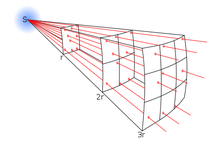Age of the universe
| Part of a series on |
| Physical cosmology |
|---|
 |
In cosmology, the age of the universe is the amount of time since the Big Bang. The best measurement of the age of the Universe is 13.8 billion years (specifically, 13.798±0.037 billion years).[1][2] The most recent and most accurate measurements were made by the Planck spacecraft. These measurements were made using the cosmic microwave background radiation and the expansion of the Universe.
A conclusion from one mathematical model, says that the age of the Universe is about 26.7 billion years: that was published July 2023 in Monthly Notices of the Royal Astronomical Society.[3][4][3][4][3]"[3]
History
[change | change source]In the 1800s, evidence from geology showed that the Earth was at least millions of years old. Later, it was thought that the universe was unchanging. However, in the 1920s, Georges Lemaître and Edwin Hubble determined that the universe was expanding (see Hubble's law). Although the estimates made using the initial data were low, radioactive dating on Earth could be used to give measurements of 11–20 billion years[5] to 13–15 billion years.[6][7] Eventually, scientists were able to make much better measurements using spacecraft.
Possible future
[change | change source]Unknown, though there are various theories to explain the possible future of planet Earth. There are various scientific theories that explains how the Earth might end. Among of them, one of the most popular theories is that the Sun will eventually become a red giant and consume the Earth.[8] However, there are other logical theories that explain how the Earth might end.
References
[change | change source]- ↑ Planck Collaboration (2013), Planck 2013 results. I. Overview of products and scientific results
- ↑ Bennett C.L.; et al. (2013), Nine-Year Wilkinson Microwave Anisotropy Probe (WMAP) Observations: Final Maps and Results
- ↑ 3.0 3.1 3.2 3.3 Rajendra P. Gupta (7 July 2023). "JWST early Universe observations and ΛCDM cosmology". Monthly Notices of the Royal Astronomical Society. 524 (3): 3385–3395. arXiv:2309.13100. doi:10.1093/mnras/stad2032. Retrieved 22 January 2024.
{{cite journal}}: CS1 maint: unflagged free DOI (link) - ↑ 4.0 4.1 Rizk, B. (13 July 2023). "New research puts age of universe at 26.7 billion years, nearly twice as old as previously believed". Phys.org. Retrieved 22 January 2024.
- ↑ Britt RR (2003-01-03). "Age of Universe Revised, Again". space.com. Retrieved 2007-01-08.
- ↑ Wright EL (2005). "Age of the Universe". UCLA. Retrieved 2007-01-08.
- ↑ Krauss LM, Chaboyer B (2003). "Age Estimates of Globular Clusters in the Milky Way: Constraints on Cosmology". Science. 299 (5603). American Association for the Advancement of Science: 65–69. doi:10.1126/science.1075631. PMID 12511641. S2CID 10814581. Retrieved 2007-01-08.
- ↑ Blackman, Joshua; Bennett, David; Beaulieu, Jean-Philippe 2021. A crystal ball into our Solar System's future: giant gas planet orbiting a dead star gives glimpse into the predicted aftermath of our Sun's demise. Keck Observatory. [1]
